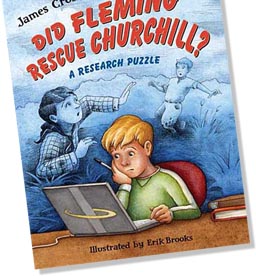This is not your daddy’s research paper! The times, they are a-changin’. Teaching students to write even a short research paper is a much more complicated task now than it used to be. The standard texts still haven’t caught up to the realities of the age of the internet. The luddite solution – rejecting the internet as a research tool – ceased to be an option several years ago. But using the internet is fraught with dangers. It takes a certain level of experience, and detective skills to be able to sort the wheat from the chaff. The detective skills are what we need to be teaching students. They need to know, and practice, how to evaluate an internet source.
 Along comes an excellent book on precisely this topic – by an accomplished writer of children’s biographies and non-fiction, James Cross Giblin. The book is written as a first-person narrative by Jason, a fifth grade boy. In 64 pages Giblin has us follow along as Jason works on an assignment to write a three-page biography of Alexander Fleming, the inventor/discoverer of penicillin. Jason starts with traditional sources, encyclopedia articles and library books. And then he also does some internet searching. On the internet, he finds a great anecdote describing how Fleming’s father saved the young Winston Churchill, and as a reward Lord Randolph Churchill agreed to pay for Fleming’s education. The only problem is that the anecdote may not be true. Most of the book is devoted to Jason’s efforts to evaluate the story and how he goes about deciding whether to include it in his assignment or not.
Along comes an excellent book on precisely this topic – by an accomplished writer of children’s biographies and non-fiction, James Cross Giblin. The book is written as a first-person narrative by Jason, a fifth grade boy. In 64 pages Giblin has us follow along as Jason works on an assignment to write a three-page biography of Alexander Fleming, the inventor/discoverer of penicillin. Jason starts with traditional sources, encyclopedia articles and library books. And then he also does some internet searching. On the internet, he finds a great anecdote describing how Fleming’s father saved the young Winston Churchill, and as a reward Lord Randolph Churchill agreed to pay for Fleming’s education. The only problem is that the anecdote may not be true. Most of the book is devoted to Jason’s efforts to evaluate the story and how he goes about deciding whether to include it in his assignment or not.
Cyndy was so impressed with the lessons communicated that she’s considering assigning this book as a first reading assigment for her 9th grade academic writing class. The book does an excellent job of presenting the issue of “urban legends” and internet sources, while offering very practical suggestions about how to track down a story of doubtful provenance (via snopes.com and urbanlegends.com among others).
THESE are the skills we need to teach our children. In the olden days (when I was young and dinosaurs roamed the earth), the library bestowed a certain trustworthiness on source books. If the librarians had selected the book for the library shelves, it was probably reliable. That was certainly naive, but it did make life easier. In the wild west frontier towns of the internet, there are no gatekeepers or librarians. And so our children need an introduction to the problems of unreliable sources and they need practice and guidance in developing internet-savvy research skills. Teaching them to use google is not enough. They will have to be more sophisticated than that.
This book is an excellent way to help them learn how to navigate the brave new world. Did Fleming Rescue Churchill? is a 64 page hardback, $16.95 and can be ordered directly from Greenleaf Press. Henry Holt is the publisher, and I’m REALLY hoping they will bring this out in paperback quickly. But don’t wait. It’s worth having in your toolbox now.
– Rob Shearer
Director, Schaeffer Study Center
Publisher, Greenleaf Press
PS: Giblin’s other books are excellent reads as well:






Please tell me this book mentions http://www.wikipedia.org/?!
Quoting a “free-content Internet encyclopedia” as a legitimate reference is akin to believing the concoction is yummy ’cause my brother made it.
Digesting either of these makes my stomach hurt!
Thanks, Rob, for the book recommendation!
Wikipedia is not a bad place to visit for a quick orientation on many topics. The problem is, one cannot always be certain that the information will be accurate.
I find myself reading wiki articles the way I read a college research paper I might have to grade… check the footnotes, click on the references, judge the overall quality by the tone, balance, etc. There are lots of non-controversial articles that are just fine… and then there are the flame wars in a few conspicuous pages.
Which is why our kids need to learn and practice the source evaluation skills introduced in the book. Really, we should be reading everything critically these days. With print-on-demand, anybody with $30 can produce a book… and lots of them have!
– Rob